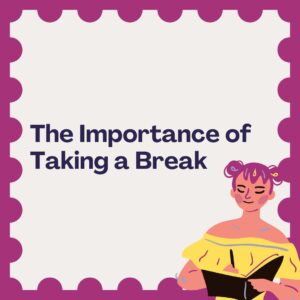The Importance of Taking a Break During and After Writing
Writing can be an exhilarating yet exhausting process, often requiring intense focus and creativity. However, many writers overlook the significance of taking breaks, which can lead to burnout, decreased productivity, and diminished creativity. This comprehensive guide will explore the importance of taking breaks during and after writing, the benefits they offer, effective strategies for incorporating breaks into your writing routine, and tips for maximizing your time away from the page.

Table of Contents
Understanding the Need for Breaks
Taking breaks during and after writing is essential for maintaining mental clarity, creativity, and overall well-being:
- Writing requires sustained concentration, which can lead to fatigue over time.
- Regular breaks help recharge your mind and body, making you more productive in the long run.
The Science Behind Taking Breaks
Research supports the idea that taking breaks can enhance cognitive function and improve overall performance:
Cognitive Benefits
- Improved Focus: Short breaks can help refresh your mind, allowing you to return to your work with renewed concentration.
- Enhanced Creativity: Stepping away from your writing can lead to new ideas and perspectives when you return.
Example:
Studies have shown that taking breaks can lead to increased problem-solving abilities and creative thinking.
Emotional Well-being
Writing can be emotionally taxing, especially when dealing with challenging topics:
- Taking breaks allows you to process emotions and reduce stress levels.
- Engaging in enjoyable activities during breaks can boost your mood.
Example:
Writers who take time to relax or engage in hobbies report feeling less overwhelmed and more motivated.
Physical Health
Prolonged periods of sitting while writing can lead to physical discomfort:
- Taking breaks encourages movement, reducing the risk of musculoskeletal issues.
- Short walks or stretches during breaks promote better circulation and overall health.
When to Take Breaks While Writing
Knowing when to take breaks is crucial for maintaining productivity:
Signs You Need a Break
Pay attention to signals from your body and mind that indicate it’s time for a break:
- Decreased concentration or focus.
- Feelings of frustration or overwhelm.
- Physical discomfort or fatigue.
Example:
If you find yourself staring at the screen without making progress, it’s a sign that a break is needed.
Recommended Break Intervals
Implementing structured break intervals can enhance productivity:
- The Pomodoro Technique suggests working for 25 minutes followed by a 5-minute break.
- After four cycles, take a longer break of 15–30 minutes.
Types of Breaks to Consider
Different types of breaks serve various purposes:
Short Breaks
Short breaks are quick pauses that help refresh your mind:
- Use these breaks for light stretching, grabbing a snack, or simply stepping away from your workspace.
Example:
A quick walk around your home or office can help clear your mind.
Long Breaks
Longer breaks are essential for deeper relaxation:
- Use this time for meals, exercise, or engaging in hobbies that bring you joy.
Example:
Taking an hour-long lunch break allows you to recharge mentally and physically before returning to writing.
Creative Breaks
Engaging in creative activities during breaks can stimulate new ideas:
- Consider drawing, journaling, or listening to music as a way to inspire creativity.
How to Effectively Use Your Break Time
Maximize the benefits of your breaks by engaging in activities that promote relaxation and rejuvenation:
Engaging in Physical Activity
Movement is vital for combating fatigue:
- Incorporate short exercises or stretches during your breaks to invigorate your body.
Example:
Doing a few yoga poses or going for a brisk walk can help reset your focus.
Practicing Mindfulness and Relaxation Techniques
Mindfulness practices can reduce stress and enhance clarity:
- Consider deep breathing exercises or meditation during longer breaks.
Example:
Spending five minutes focusing on your breath can help calm racing thoughts.
Exploring New Inspirations
Use break time to seek inspiration outside of writing:
- Engage with art, nature, or other creative pursuits that spark joy and curiosity.
The Role of Post-Writing Breaks
Taking time after completing a writing session is just as important as taking breaks during writing:
Reflecting on Your Work
Post-writing breaks allow you to reflect on what you’ve accomplished:
- Take time to assess what went well and what could be improved in your writing session.
Example:
Journaling about your writing experience can provide valuable insights for future sessions.
Allowing Ideas to Marinate
Stepping away from your work helps ideas settle:
- Give yourself permission not to think about writing immediately after finishing; this allows subconscious processing.
Common Mistakes Writers Make Regarding Breaks
Writers often overlook the importance of taking effective breaks:
- Skipping Breaks: Many writers feel guilty about taking time off; remember that breaks enhance productivity.
- Taking Ineffective Breaks: Scrolling through social media may not provide the mental rest needed; opt for activities that genuinely refresh you.
- Ignoring Physical Needs: Neglecting physical discomfort can lead to burnout; prioritize self-care during long writing sessions.
Incorporating Breaks into Your Writing Routine
Creating a structured approach to incorporating breaks into your routine is essential:
- Set Specific Times: Schedule regular intervals throughout your writing day dedicated solely to breaks.
- Use Timers: Implement techniques like the Pomodoro Technique with alarms or apps that remind you when it’s time for a break.
- Plan Rewarding Activities: Choose enjoyable activities during breaks that motivate you to step away from work willingly.
Resources for Writers on Taking Breaks
Utilizing resources can enhance your understanding of effective break-taking strategies:
- Books on Productivity: Titles like Deep Work by Cal Newport explore how focused work combined with strategic breaks leads to success.
- Online Articles: Websites like Noisli provide insights into creating productive environments and emphasize the importance of regular breaks.
- Writing Communities: Join forums where writers share their experiences with managing productivity through effective break-taking strategies.
Conclusion
Taking regular breaks during and after writing is essential for maintaining creativity, focus, and overall well-being! By understanding its importance—utilizing effective techniques while avoiding common pitfalls—you’ll be well-equipped to create a sustainable writing practice!
Discover marketing services, interviews & publishing tools at SharingStories.




